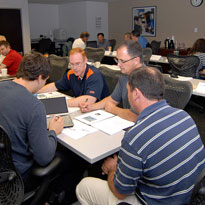Software Engineering: Advanced
- Course:Software Engineering: Advanced
- Course ID:SWENG2 Duration:3 days Where: Your Office (7+ Persons)
- Download Course Description (PDF)
Available as a private, customized course for your group at your offices or ours and in some cases as a WebLive(TM) class.
Course Outline
- Introduction: Why Study Software Engineering?
- Life Cycle Models
- Software Project Life Cycle Model
- Software Process Life Cycle
- Organization Process Assets
- Software Project Life Cycle Process
- Model Descriptions
- Strengths and Weaknesses
- Case Study
- Phase Artifacts/Outputs
- Software Life Cycle vs Project Management Life Cycle
- Objectives, Principles, Attributes
- Objectives: Reusability, Maintainability, Concurrent Documentation, Testability, Correctness, Reliability, Portability
- Principles: Concurrent Documentation, Hierarchical Decomposition, Functional Decomposition,Information Hiding, Stepwise Refinement, Structured Programming, Life-Cycle Verification
- Attributes: Reduced Coupling, Enhanced Cohesion, Reduced Complexity, Well-Defined Interfaces, Readability, Ease of Change, Traceability, Visibility of Behavior, Early Error Detection
- Documentation Principles
- Concurrency, Maintainability, Correctness, Portability, Reusability, Reliability, Testability, Traceability, Adaptability, Accessibility
- Types of Interfaces
- Project Initiation
- Description of the Business Needs/Problem to Be Solved, Objective(s), Scope
- Feasibility Studies and Estimating
- People Management (Socio-Technical Systems)
- Technical and social skills and skill sets
- Team size and communication
- Developing, maintaining, and updating a resourced project schedule and resource plan.
- Configuration Management
- Change Management
- Risk Management
- Process Improvement: Software Engineering Institute’s Capability Maturity Model (SEI CMM)
- Object Oriented Analysis and Design
- Requirements Definition
- Stakeholders, Buy-in
- Joint Application Development (JAD)
- Requirements Management
- User Interfaces, Prototyping
- Alternatives Analysis
- Validation and Verification
- Design
- Architectural Design
- Application Architectures
- Decomposition: Functional and Modular
- Object Oriented Analysis and Design
- Procurement
- Design Patterns
- Development and Testing
- Object Oriented Programming
- Validation and Verification
- Types of Testing
- Unit, integration, white-box, black-box, path, boundary value analysis, equivalence classes, regression
- Implementation and Support
- Deployment
- Types of Maintenance: Corrective, Perfective, Preventive, Adaptive
- Wrap-up:
- Future of Software Engineering
- Course Recap, Q/A, and Evaluations
Course in a Nutshell
This, the second of our two courses on software engineering, focuses on the software engineering toolkit.
Building on the overview of the software lifecycle provided by the first course, it undertakes an in-depth study of the methodology and practice of software engineering. Upon completion of this course, you will have acquired a good understanding of the tools and techniques used throughout the software lifecycle from the conception to the installation and maintenance.
Customize It!
- Are you a project manager, analyst, programmer, testing/debugging, or integration specialist and need a better understanding of how your work fits into the software lifecycle? We can emphasize the phases relevant to your particular needs while also trying to give you a broad understanding of the full lifecycle.
- Are you involved in certain areas or phases of software development? The course can be tailored to focus on those areas or phases.
- Are you interested in particular techniques of software development? If so, we can emphasize those parts of this course that focus on the areas and tools pertinent to your project or product.
- Are you involved in the marketing, sales, or post-sales support of software and need a better understanding of how your job fits into the overall software lifecycle? We can customize the course to focus on those issues.
Learn How To
Describe and apply the key concepts and techniques for:
- Software inception: Feasibility and estimation.
- Requirements elicitation and definition.
- Analysis and different design approaches and patterns.
- Management of configuration, change, and risk.
- Joint Application Development (JAD)
- Prototyping and user interfaces.
- Object oriented analysis, design, and programming.
- Coding and testing.
- Deployment and maintenance.
- Project management.
- Verification
Aimed At
Individuals involved in software development who have a general understanding of the software development lifecycle and wish to deepen their knowledge of software engineering techniques and tools.

